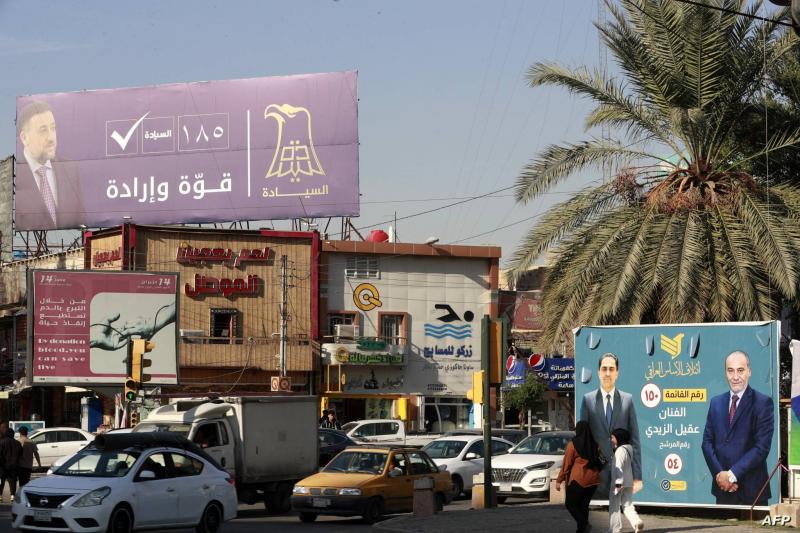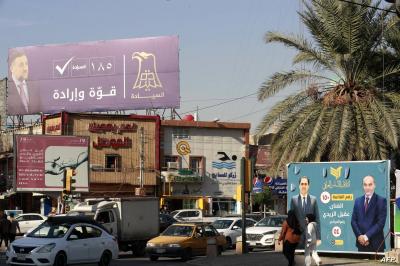Iraq recently announced the results of the local council elections, with the "Taqaddum" party led by the ousted parliament speaker Muhammad al-Halbousi coming in first in Baghdad, followed by the "State of Law" coalition led by Nuri al-Maliki.
According to the Electoral Commission, the "Taqaddum" party, led by Halbousi, received over 132,000 votes in Baghdad, surpassing the coalition of Prime Minister Nuri al-Maliki, which garnered around 130,000 votes. However, although Halbousi's victory may come as a surprise to the "Coordination Framework," it still holds significant political symbolism, as Shiite forces could form a large coalition to confront him and establish a majority in the local council.
In Anbar, Halbousi also ranked first with over 154,000 votes, outpacing other coalitions, while the "Anbar Our Identity" alliance came in second with around 70,000 votes. With the votes Halbousi obtained, he can be viewed as one of the unexpected political surprises from the election results, having garnered nearly half a million votes from Iraqi voters. He also won in Diyala (East) with about 75,000 votes, in Salah al-Din (North of Baghdad) with more than 48,000 votes, and in Nineveh with approximately 71,000 votes.
**Who Won Basra?**
In Basra, the "Tassim" alliance led by current governor Asaad al-Eidani performed strongly, winning by a considerable margin against its nearest competitors within the "Coordination Framework." Eidani received over 26,000 votes, while the "Build" alliance, which includes the "Sabaya al-Haq" movement, only achieved half that number. Nonetheless, the "Build" coalition won in the cities of Nasiriyah, Maysan, and Babil. However, there is a convergence with competing alliances, notably the "State of Law" coalition, and it is expected that negotiations regarding the formation of local governments there may be delayed for an indeterminate time.
Members of the "Coordination Framework" are competing across several lists, with former Prime Minister Nuri al-Maliki forming his own list, while other groups are engaging in separate lists but have indicated that they will govern together post-elections.
In Mosul, the resigned governor Najm al-Jubouri came in first after receiving more than 141,000 votes, surpassing both Halbousi's party and the Kurdistan Democratic Party.
**What About Kirkuk?**
In Kirkuk, the "National Union of Kurdistan," led by Pavel Talabani, triumphed over its rival, the "Kurdistan Democratic Party," headed by Masoud Barzani. Meanwhile, Arab lists achieved significant numbers that could constitute half of the local council, particularly after a Christian Arab secured a seat within the "quota" allocation. Observers are closely monitoring the oil-rich city of Kirkuk, where elections are being held for the first time since 2005, against a backdrop of recently heightened tensions among ethnic groups, which have escalated into violence especially between Kurds, Arabs, and Turkmen.
The last local elections occurred in 2013 and had been postponed since then due to the war against ISIS militants, who seized large parts of Iraq, though they were eventually defeated. Security in the country has gradually improved since then, shifting general focus to crumbling government services, high unemployment rates, and widespread corruption—issues that were central to the mass protests in 2019, which were violently suppressed by security forces.
**Red and Yellow Complaints**
Regarding complaints, Jumana al-Ghalay, a spokesperson for the commission, confirmed to local media that the number of complaints about special voting reached 54, while general voting complaints totaled 15. She explained that the yellow complaints—those that do not impact election results and are dismissed for lacking evidence or for violating formal or substantive criteria—amounted to 43. She mentioned that the number of green complaints, stemming from violations committed either by election staff or by representatives of political entities or security forces, was 20; these do not affect the election results either but require investigation and accountability of the negligent parties. Additionally, there are six other complaints currently under review.
**Extravagance of Funds**
Following the announcement of the results, some insights regarding the extravagant spending of funds by lists, coalitions, candidates, traders, and investors surfaced in political circles, leading to questions about the monetary benefits of a seat in a provincial council, where the monthly salary does not exceed two million dinars.
Political activist Abdullah Al-Zaydi indicated that "the funds spent in the elections on December 18 are the highest in all previous election cycles. We are facing billion-dollar budgets allocated for competition and garnering votes through various means, including immediate services like constructing roads, draining water, purchasing transformers, or supporting the underprivileged." He added that "the figures leaking from political circles indicate billions of dinars have been spent by traders, investors, and wealthy officials, some of whom possessed nothing before 2003."




